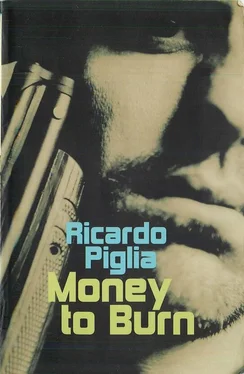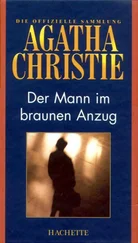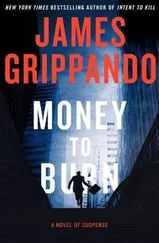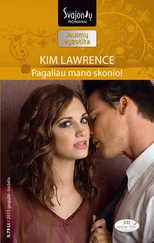At that point they heard a buzzer, perhaps they even heard it before it sounded, an instant before they first heard the metallic buzz and then the voice calling up to them.
They'd been playing cards for a little while, on the wicker table covered with a white kitchen cloth, by the light of a fringed chandelier, in the middle of the room overlooking the street, when they heard the metallic buzzer, sounding like a rat squealing, a devil shrieking, a microphone making a metallic hum as it's first connected and then the voice warning them to give themselves up.
It was the police.
The voice that reached them was distorted, a falsetto, a typical pig's voice, twisted and arrogant, empty of every sentiment apart from those of an executioner. The type of voice used to bellowing, convinced that the other will obey or dissolve on the spot. This is the voice of authority, the one you hear over loudspeakers in the cells, in hospital corridors, in the dungeons where they transport prisoners in the middle of the night, across the empty city down into the police station basements to torture them with lashes and electricity.
Mereles and the Kid exchanged looks.
The pigs.'
Hearts thumping at a thousand beats, heads feeling as if illuminated by a white light and thoughts grabbing brains like leeches. All for an instant and then it was impossible to feel or think at all. What has to be most feared, the worst thing in life, always happens out of the blue, without anyone being ready for it, which makes it all the worse, because one is both waiting but has no time to get used to the idea and is caught out, paralysed, yet obliged to act and take decisions. The bottom line is that what one most secretly fears always occurs, and all along they had been convinced they had the cops on top of them, or at least breathing down their necks, and that the lair into which they had clambered was too tranquil, too perfect, that they ought to have stayed out on the streets, going round and round in the car until they'd invented a means of escaping the city and the police roadblocks, they'd thought of doing it but had felt too claustrophobic and nobody had said anything, and now it was too late, and they were all corralled in here together.
'We know who you are. You are completely surrounded.'
'Everyone in flat number nine, come out with your hands held high.'
The Kid switched out the lights and the Gaucho leapt across to the little room and began handing out the Thompson, the.9 Falcon, the sawn-off shotgun, spinning them across the floor towards the windows where the Kid and the Crow had holed themselves up.
An icy light came in from the street and illuminated the flat with a ghostly sheen. The white spotlights on the reflectors entered between the slats on the Venetian blinds and filled the air with stripes, luminous rays floating in the dust like a cloud. The three remained, semi-concealed, tattooed by the rays of light, and leaned out of the window, attempting to figure out where things stood.
'It was that little whore…'
'And Malito?…'
'How many are there? Why aren't they coming up?'
They moved in the twilight and tried to locate the police. Their first sensation was that they were being forced to move blind, encircled by the utmost danger, like someone driving in the countryside at night, sensing he's about to crash, and feeling the air with his hands, as though to divine whether there's an electric current out there, in the midst of all that darkness. The only light indoors was the glow of the television left on without sound. Dorda was in a corner and opened his bag of drugs. He held his machine-gun in one hand while with the other he was chopping up the coke on his watch-face. It was 10.40 p.m.
'We have you surrounded. This is the chief of police speaking. Hand yourselves over now.'
In the darkness the Kid is crouching and cautiously leaning out of the window. In the street shadows can be seen, two patrol cars can be seen, two searchlights illuminating the building's façade can be seen.
'What's up?' asks Dorda.
'We're fucked.'
Dorda puts the machine-gun down on the floor, sits down with his back propped against the wall, opens a small rectangular box of silvery metal, and then in a complicated and rapid manoeuvre shoots himself a dose of cocaine into a vein in his right arm. He does so because he can hear voices in the distance, now, soft voices, women's voices, and he doesn't want to hear them, he wants the whiteness to cure them, the white that rises in his veins wiping the noise of the voices, in the plates of his brain, between his bones, the passages have their own capillaries along which the delicate women's voices are echoing. Dorda hears all of this, all of the time, he tells the Kid as much, he's trying to speak in a low voice, while the cops deliberate and they deliberate too, at floor level, like rats, stuck in their crevices, in their cracks, squealing, their teeth sharpened, that's where the voices he's hearing come from. Kid. He was raving about rats, about insects infesting the nostrils of dead bodies.
'I saw photos.'
'You saw photos,' sighed the Kid. 'Quiet down, Gaucho, we're going to make them shit themselves, don't listen to what they're saying, keep watch here.'
'Malito, we know you're in apartment number nine. Surrender and come downstairs, we have a magistrate with us.'
Squatting down, the Crow curses under his breath: 'That mad shithead.'
'They think he's up here with us.'
'So much the better,' Dorda's laughing now. 'That way they think there are more of us.' Sitting on the floor, he pokes the gun out of the window. 'Shall a fire off a shot? Just one little shot?'
'Calm down, Gaucho,' the Kid tells him.
Dorda once more chops the drug on his watch-face, using his Spanish penknife with its two blades, lifting the coke on the sharpest edge, raising it with a firm wrist, without trembling, to his nose which flares and inhales, not injecting this time, it's more direct, reaches through the interstices of his skull, the whiteness, the pure air. And this is the only sound in the middle of the night. The Blond Gaucho's avid breathing as he snorts the cocaine.
The police offer a guarantee of safe-conduct to the criminals in the presence of the aforesaid Investigating Magistrate of the Second District Dr José Pedro Púrpura, but the guys don't answer him. The apartment remains in darkness, in silence, the police illuminate the walls, windows, with the patrol car's searchlight as though they were making signals from a lighthouse to a ship, but nobody responds.
Colonel Ventura Rodriguez, the Uruguayan chief of military police, once the house was 'completely encircled' (according to sources) approached the door and used the intercom system — or 'electronic caretaker' — to tell the occupants in flat number nine they were surrounded and should surrender, offering assurances that their lives would be respected. Mereles was now in the kitchen, intercom phone in hand, and the Kid standing at his side. They had opened the door to the freezer and the cold clarity of its spectral glow allowed them to look at one another while they pressed their faces to the receiver to listen.
'Why don't you come up and get us?' shouted the Kid.
'My friend, this is the chief of police speaking, I am the one who is guaranteeing that your lives will be respected.'
'Why don't you come up and play a round of poker with us, Chief?'
'Here is the magistrate who will safeguard your defence, and assures you that you will not be taken to Buenos Aires.'
'But that's what we want, sunshine, to go and fight in Buenos Aires, where that bastard of a Police Commissioner Silva is…'
'I can't do any more for you lot. I can only guarantee your lives and a fair trial…'
Fresh and worse insults were the only response. At one moment or other they answered that while the police were getting hungry, they were eating roast chicken and slugging whisky, in addition to which they still had three million pesos to divvy out.
Читать дальше












